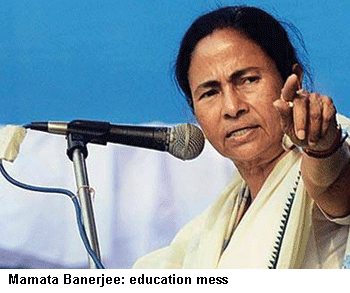 Since under her leadership, the unfancied Trinamool Congress (TMC) party famously routed the Communist Party of India-Marxist (CPM)-led Left Front government, which ruled West Bengal uninterruptedly for 34 years (1977-2011), in the historic assembly election of 2011, chief minister Mamata Banerjee has come a long way. But, even though TMC was re-elected in 2016, and Banerjee has established herself as a national leader after modestly reviving industry and agriculture growth in West Bengal, she hasn’t succeeded in redeeming her promise to radically reform the state’s education system and restore West Bengal’s top-ranked schools, colleges and universities — ruined by the mass infiltration of under-qualified CPM cadres into higher education institutions — to their pre-communist era glory.
Since under her leadership, the unfancied Trinamool Congress (TMC) party famously routed the Communist Party of India-Marxist (CPM)-led Left Front government, which ruled West Bengal uninterruptedly for 34 years (1977-2011), in the historic assembly election of 2011, chief minister Mamata Banerjee has come a long way. But, even though TMC was re-elected in 2016, and Banerjee has established herself as a national leader after modestly reviving industry and agriculture growth in West Bengal, she hasn’t succeeded in redeeming her promise to radically reform the state’s education system and restore West Bengal’s top-ranked schools, colleges and universities — ruined by the mass infiltration of under-qualified CPM cadres into higher education institutions — to their pre-communist era glory.
Instead, during the past seven years of TMC rule, there’s been frequent campus violence and student protests over petty issues, mass copying, and scandals over school and college admission procedures. Therefore, not a few independent academics contend that Banerjee’s inept management of several political issues has made the messy education situation she inherited from the Communists, worse.
For instance, the TMC government’s out-of-the-blue announcement on May 16 last year (2017) making Bengali a compulsory subject in classes I-X of all 92,000 government and over 8,000 private schools — regardless of exam board affiliation — aroused the ire of the already disgruntled Nepali-speaking Gorkha majority in the hill areas of the state where the writ of the Gorkha Janmukti Morcha (GJM), a political party which dominates the semi-autonomous Gorkhaland Territorial Administration, runs large. The imposition of Bengali as a compulsory language for all schools prompted GJM to call a general strike which lasted a record 105 days and shut down all 48 schools in the hills, disrupting the studies of thousands of children from across India, Nepal, Bangladesh, Thailand, and Bhutan enrolled in legacy boarding schools of the hills.
“More than 35 percent of students left the boarding schools of the hills districts during the prolonged Gorkhaland statehood agitation of 2013, never to return and it took almost five years to stabilise the situation. The second agitation last year which shut down the hill schools for 105 days further damaged the image of our schools,” says Robindra Subba, promoter-director of the Himali Boarding School, Kurseong (HBS, estb.1978), and ranked West Bengal’s #1 co-ed boarding school in the EducationWorld India School Rankings 2017-18. Clearly, exasperated by repeated strikes, bandhs and civil unrest in the Darjeeling district, on May 25, HBS inaugurated its second campus in Siliguri (pop. 513,264), a town 35 km from Kurseong. “HBS, Siliguri, will offer the tried-and-tested education typical of the Darjeeling hills. We want Siliguri to experience it,” says Subba putting a brave face on the situation.
In higher education as well, TMC’s record of the past seven years is unimpressive. Calcutta and Jadavpur universities have been poorly rated under the parameter of ‘regional diversity’ i.e, capability to attract students from outside the state or other countries, in the Union HRD ministry’s National Institutional Rankings Framework (NIRF) published in April. Calcutta University is awarded a score of 1.83 out of 3 in NIRF 2018 and Jadavpur, ranked #13 in the overall category, is awarded a mere 0.33. In short, these vintage varsities, which are also awarded poor scores on the parameter of public perception, have lost their reputation as national universities. Unfortunately, both these once highly regarded universities have become infamous for campus violence and unrest.
Following 34 years of uninterrupted rule of the CPM and Left parties, West Bengal’s varsity campuses have transformed into strongholds of leftist students and faculty unions. After the TMC swept to power seven years ago, TMC student unions have repeatedly attempted to oust them by force resulting in frequent campus violence. Moreover, instead of heeding the advice of expert committees and academics who have proposed radical curriculum and administrative reforms, the TMC government has introduced cosmetic changes in the education sector by painting school buildings, imposing Bengali as a compulsory subject, introducing biometric attendance for college professors etc. Little wonder the spreading disillusionment within the academy.
Baishali Mukherjee (Kolkata)